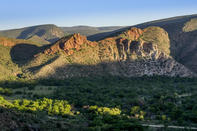Centuries Ago
The Addo area has a rich history, as it was home to the Khoisan clans of Iqua, Damasqua and Gonaqua, centuries ago, who shared the area with vast herds of wild animals. In the 1700s this group of hunter gatherers were tragically wiped out by a smallpox epidemic. Nomadic Xhosa tribes settled in the Addo area at this time, as did European farmers.

The wildlife conflicted with the farming practices in the area and were all but eradicated during the 1700 and 1800s. In 1919 the farmers called on the then government to intervene with the destruction being caused by the elephants to their all important crops and water supply.
Slaughter and Changes

The elephants were to be exterminated by government decree and between 1919 and 1920, 114 elephants were slaughtered. Public opinion changed in the 1930s and the Addo Elephant National Park was born in 1931, in an attempt to save the remaining elephants.
Conflicts between farmers and wildlife continued in Addo, until an elephant proof fence was erected in 1954. There were only 22 elephants left at this time. Today, the fence remains and helps to protect not only the now over 600 elephants but also the rich biodiversity of the area.
Addo Town itself, developed around the railway junction where the line branches off to the Sundays River Valley, and a picturesque stopover on South African holidays along the Garden Route. The Khoikhoi name is said to mean 'euphorbia ravine', a reference to the abundance of tree euphorbias growing in the Addo area.
 There’s no better way to enjoy your Accommodation in Addo Elephant National Park than with a sundowner sitting on your stoep and watching,...
There’s no better way to enjoy your Accommodation in Addo Elephant National Park than with a sundowner sitting on your stoep and watching,... Addo Elephant National Park in the Eastern Cape, is the third largest national park in South Africa. This malaria-free safari destination is...
Addo Elephant National Park in the Eastern Cape, is the third largest national park in South Africa. This malaria-free safari destination is...